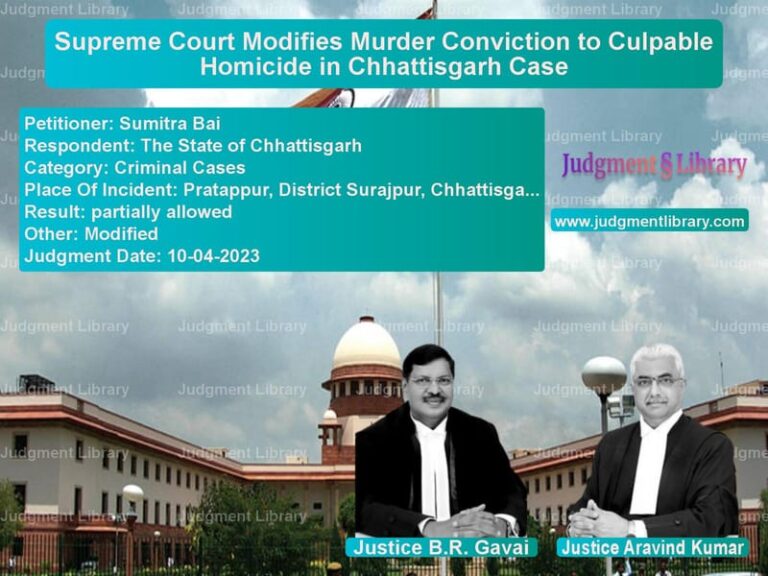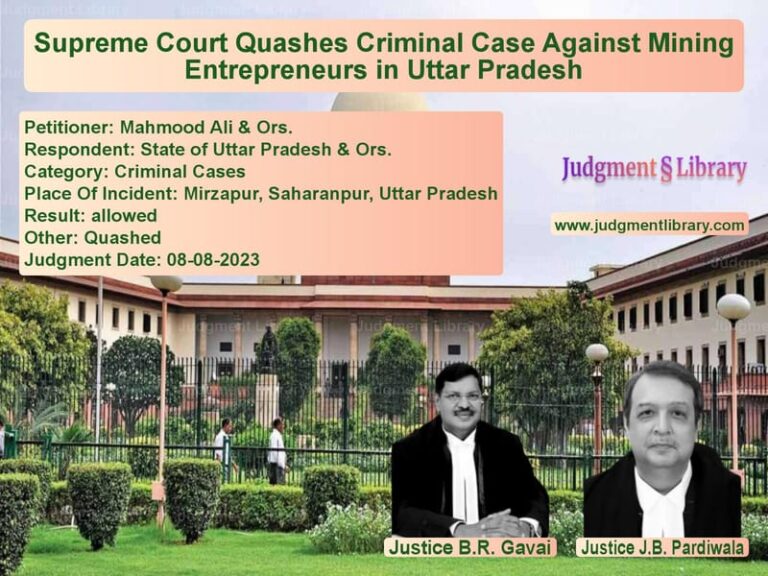Consumer Protection Act: Supreme Court Rules on Maintainability of Revision Petitions in Execution Proceedings
The case of Karnataka Housing Board vs. K.A. Nagamani deals with a significant legal issue concerning the maintainability of a revision petition under Section 21(b) of the Consumer Protection Act, 1986, before the National Consumer Disputes Redressal Commission (NCDRC) in execution proceedings. The Supreme Court ruled that a revision petition is not maintainable against an order passed by the State Commission in an appeal arising from execution proceedings.
This case arose when the Karnataka Housing Board (KHB) was directed to pay interest on refunded amounts to a complainant due to deficiencies in service. While the Board complied with the execution order, the complainant sought additional amounts, leading to further litigation. The Supreme Court clarified the legal position regarding execution proceedings under the Consumer Protection Act.
Background of the Case
The respondent, K.A. Nagamani, applied for the allotment of a High-Income Group (HIG-B) flat under the Self-Financing Housing Scheme at Kengeri, Bangalore. The Karnataka Housing Board (KHB) initially allotted Flat No. 116, Type B, on the First Floor, with a provisional allotment letter issued in 1992 stating that the cost of the flat was Rs. 3,15,000, payable in installments.
The respondent deposited Rs. 2,67,750 in four installments. However, in 1995, the Board issued a letter allotting a different flat at an increased cost of Rs. 5,90,000. The respondent declined the new allotment and requested a refund of her deposited amount.
The Board refunded Rs. 2,63,813 after deducting Rs. 3,937. Dissatisfied with this, the respondent filed a consumer complaint seeking interest on the refunded amount and additional compensation for the delay.
Petitioner’s Arguments
The Karnataka Housing Board, represented by its legal counsel, argued:
- The revision petition before the NCDRC was maintainable under Section 21(b) of the Consumer Protection Act, as execution proceedings are a continuation of the original consumer dispute.
- The revisional jurisdiction of the NCDRC extends to all proceedings before the State Commission, including execution matters.
- The complainant’s claim for additional interest was not justified, as the Board had already complied with the refund order.
- The Delhi High Court erred in ruling that the NCDRC lacked jurisdiction to entertain a revision petition against an order passed in execution proceedings.
Respondent’s Arguments
K.A. Nagamani, appearing in person, countered:
- Execution proceedings are separate and distinct from the original consumer complaint and do not fall under the definition of a “consumer dispute” as per Section 21(b) of the Consumer Protection Act.
- The NCDRC had no jurisdiction to entertain a revision petition in an execution appeal.
- The Board was attempting to evade its liability by challenging settled claims under the garb of a revision petition.
- The Delhi High Court’s ruling was correct in holding that the NCDRC lacked jurisdiction over execution matters.
Supreme Court’s Analysis
The Supreme Court examined the scope of Section 21(b) of the Consumer Protection Act and whether execution proceedings constitute a “consumer dispute.” Key legal findings included:
- The term “consumer dispute” under Section 21(b) refers to proceedings involving a substantive adjudication of consumer rights and obligations.
- Execution proceedings are distinct from consumer disputes, as they deal solely with enforcing previously decided claims.
- Orders passed in execution proceedings do not constitute a “consumer dispute” and cannot be challenged under the revisional jurisdiction of the NCDRC.
- Revisional jurisdiction under Section 21(b) applies only to cases where a State Commission has exercised or failed to exercise jurisdiction in a “consumer dispute.”
- The Delhi High Court correctly ruled that the NCDRC had no authority to entertain a revision petition against an execution appeal.
Key Judicial Findings
The Supreme Court ruled:
- The revision petition filed by the Karnataka Housing Board before the NCDRC was not maintainable.
- The Delhi High Court’s judgment setting aside the NCDRC’s order was upheld.
- The execution proceedings should proceed as directed by the State Commission without interference from the NCDRC.
- The nature of execution proceedings is distinct from a “consumer dispute” and cannot be challenged under Section 21(b) of the Consumer Protection Act.
Conclusion and Impact
The Supreme Court’s decision clarifies the legal framework regarding execution proceedings under the Consumer Protection Act. By ruling that execution proceedings are separate from “consumer disputes,” the judgment ensures that revisional jurisdiction is not misused to delay the enforcement of consumer claims.
This ruling sets an important precedent for consumer protection cases, ensuring that litigants cannot circumvent execution orders through revision petitions before the NCDRC. It reinforces the finality of consumer dispute adjudications and strengthens consumer rights in obtaining timely enforcement of judgments.
Petitioner Name: Karnataka Housing Board.Respondent Name: K.A. Nagamani.Judgment By: Justice Uday Umesh Lalit, Justice Indu Malhotra.Place Of Incident: Bangalore, Karnataka.Judgment Date: 06-05-2019.
Don’t miss out on the full details! Download the complete judgment in PDF format below and gain valuable insights instantly!
Download Judgment: Karnataka Housing Bo vs K.A. Nagamani Supreme Court of India Judgment Dated 06-05-2019.pdf
Direct Downlaod Judgment: Direct downlaod this Judgment
See all petitions in Consumer Rights
See all petitions in Damages and Compensation
See all petitions in Judgment by Uday Umesh Lalit
See all petitions in Judgment by Indu Malhotra
See all petitions in dismissed
See all petitions in Quashed
See all petitions in supreme court of India judgments May 2019
See all petitions in 2019 judgments
See all posts in Civil Cases Category
See all allowed petitions in Civil Cases Category
See all Dismissed petitions in Civil Cases Category
See all partially allowed petitions in Civil Cases Category







